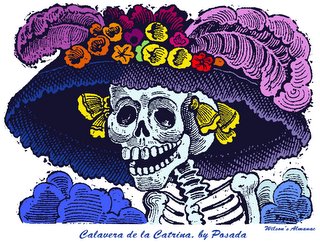
In honor of Dia de los Muertos
on another note...i've been wanting to start a topical 'blog series' kind of like Jason had last year about capitalism.
I've been wanting to talk about the idea of America-- The concept that America itself is a concept, an abstraction that shifts, evolves, adapts to different settings, different historical periods and different personal or social needs.
What does America mean?
what does it mean to immigrants?
what does it mean to soldiers?
to Christians?
to Muslims?
to city-dwelers? rural dwellers?
i think the discussion is important, because more and more, our leaders on the natonal level are shaping policy annd moving us in a direction that leads toward their particular idea of what America is. Call it religious conservatism, privitaization, villification of outsiders (immigrants, 'terrorists') and subversive insiders (gays, minorities, liberals, welfare mothers, teachers)
in any case, i think there is a case to be made for the idea that in no time in history has there ever been a unity, a nation or a community that could be called the United States. The title 'American' is an arbitrary, abstract one--yet it takes on meaning depending on your context and your other identities within your context.
Look at the history of America before the Civil War. What were the 13 colonies? Most historians agree that the bond between them was relatively weak until after the Civil War when Federal power greatly increased. What was America then? A Continental Army? A set of laws called the Constitution? A wealthy, landed elite maintaining power over the masses of disenfranchised or enslaved people? Or was it the thousands of stories of the mixing and melding of ethnic groups, the negotiation in homes, on farms, in the streets, on the frontiers of new and changing identities? Was it the experience of the Iroquois, the Sioux, the Cherokee? Was America the crucible for new cultures, languages, economies? Was it the destination for people who wanted to forget where they came from? Was it the goal of people who wanted to make things better for themselves and their decendants?
Remember that wars have been fought, people have died over the issue of what defines America. People have gone to their death clinging to the desire for this idea to be real. But it never was real, nor could it ever be. Humans have been creating America since day one, and we continue to create it, which is why i think we are either so critical or so proud of it. It is the best of what we can create and it is the worst.
One thing i want to throw out there is defining the most fundamental unit of social organization. As you go from Global to national to local, what is the point at which you cross over from the abstract to the real? Is there such thing as a global community? A nation? Is the most basic form of social organization the family? The neighborhood? the married couple? the Church?
What is America to the youth in my neighborhood? On one level,they are products of the public school system. The purpose of the public school system was to assimilate immigrants in the late 1800s and early 1900s by molding their minds around the idea that , yes, indeed there is a thing called America and here is what it looks like to be a part of it-- good citizenship, know your history, obey the rules, speak English, stay in line, no cuts, play sports, learn some skills and get a job.
Public education is the factory in which the labor force for capitalism is produced (soldiers and prisoners as well as mechanics and managers)
So....the youth in our neighborhood have some sense of a mythical and all-encompassing America. It is taught to them in the schools. But what is their experience of America outside school? That is where it gets fascinating, because they and their families are in the process of creating "America" First of all, they are "Americans" before they even crossed the borders of this nation. They come here, raise their children here, work, live, buy things, make relationships, pay taxes, commit crimes, engage in politics, re-shape the ecology, etc.
But what would they consider their community, their 'country'? Some would say Mexico, or Guatemala or El Salvador. Others would describe a 'globalized community' in which family relationships, resources and information permeate national borders and form a kind of 'third space' of identity that is not confined or defined by colors or lines on the map. Some would say Pasadena. Some California. Some would say Chicano, some Latino. Some might say 'I am an American.' ........
to be continued
No comments:
Post a Comment